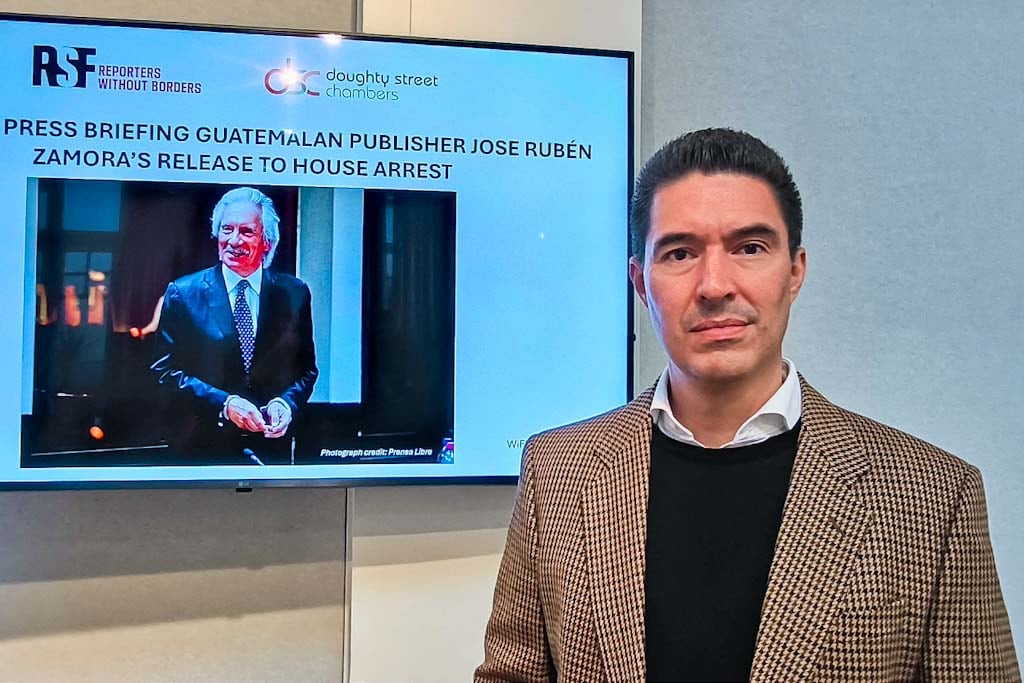
The decision of the Guatemalan justice of allow journalist José Rubén Zamora (Guatemala, 68 years old) to be released from prisonwhere he has spent more than 800 days, to comply with a house arrest order at home, has a bittersweet taste for his relatives and his lawyers. It’s a double-edged sword. “We have achieved some justice, but this process is not over,” explains the editor’s son, José Carlos Zamora, in London, who demands that the Guatemalan Government reach an amicable agreement that puts an end to a judicial process that could continue for even longer. years. Faced with the relief of having his father home again, even if he is deprived of liberty, there is a risk that international attention will fade in the face of the mirage of a solution to the conflict. a case that is far from having been satisfactorily concluded.
The journalist’s family has joined forces with the organization Reporters Without Borders and the prestigious London law firm Doughty Street Chambers, specialized in International Humanitarian Law, to keep pressure on the Government of Guatemala alive.
The new president of the country, Bernardo Arévalo, who took office last Januaryhas committed to doing everything possible to solve the injustice that Zamora suffers. The journalist was imprisoned on July 29, 2022, after the persecution by the team of former president Alejandro Giammattei (2020-2024) and by the still attorney general, Consuelo Porras, whom the United States Department of State has included in its list of corrupt and undemocratic public figures.
The diary elPeriódicowith Zamora at the helm, played a fundamental role in the fight to improve democracy and freedoms in Guatemala, with numerous investigative reports in which he uncovered corruption scandals of several governments. In May 2023, the newspaper could no longer resist pressure from the authorities and closed its doors. 200 professionals ended up on the street.
“When someone suffers persecution like the one José Rubén Zamora is suffering, the impact on freedom of information extends everywhere, not just in Guatemala,” denounced Rebecca Vincent, the international campaigns director of Reporters Without Borders, who He accompanied the editor’s son to London.
The Guatemalan Prosecutor’s Office accused Zamora of money laundering, obstruction of justice and influence peddling. A procedural construction, that President Arévalo himself, together with several international organizations has been described as “spurious”, carried out by the Prosecutor’s Office based on the sale of a painting by the artist and personal friend Elmar Rojas, which the journalist made to continue financing the newspaper. For 38,000 dollars (35,000 euros at the current exchange rate).
“Zamora’s case reflects a current trend in which the law is used to suggest that a journalist is not trustworthy. They try to suggest that this is a corrupt person, or a fraudster. They have tried to accuse José Rubén of some type of corruption or fraud, which is absolutely false. It is a tactic that seeks to provoke some discomfort in governments or humanitarian organizations, uncomfortable with the possible existence of tax crimes or corruption, and thus get them to look the other way,” Caoilfhionn Gallagher, the Doughty Street Chambers lawyer who explains to EL PAÍS. He leads the international legal consultancy of José Rubén Zamora.
A possible friendly agreement
The journalist’s son does not want to completely throw in the towel before Guatemalan justice, but suspects that he is still in the hands of a “criminal cell” that protects the corrupt and protects itself, and that he will continue maneuvering to delay the Zamora judicial process. He knows that President Arévalo is unhappy with the situation, but believes that his efforts to not interfere in justice and maintain the appearance of a rule of law in Guatemala ends up being a brake on the possible solution of the case.
“I think President Arévalo is genuinely decent. I think he’s trying to do the right thing and do it within the law. Where he could do more is when it comes to putting an end to the criminal cell, which is entrenched in the public ministry and in a group of judges,” says the son. “As long as these people are treated as judicial power, the country will have its hands tied and there will even be more political persecution.”
José Carlos Zamora seeks a friendly agreement with President Arévalo that will put an end to the ordeal and the judicial web that keeps his father trapped. “We have documented the case for years before the Inter-American Commission on Human Rights, and it is going to go to the Inter-American Court. It would be a lawsuit against the State of Guatemala, which would carry responsibilities for all those involved, as well as possible compensation. Surely the State does not want to go to the end, which could have a terrible result. That is why there is the possibility of an agreement before the process ends,” says the son of the arrested editor.
On August 28, six independent United Nations experts issued an urgent statementaddressed to the Guatemalan Government, in which they demanded an urgent response to the alleged inhumane conditions of Zamora’s arrest. They also put on the table their serious concern about the fact that he had been subjected to torture, and made clear their suspicions that the journalist’s prosecution was linked to his investigative work. “Tactics like this have a frightening effect on the country’s journalists,” they concluded.

